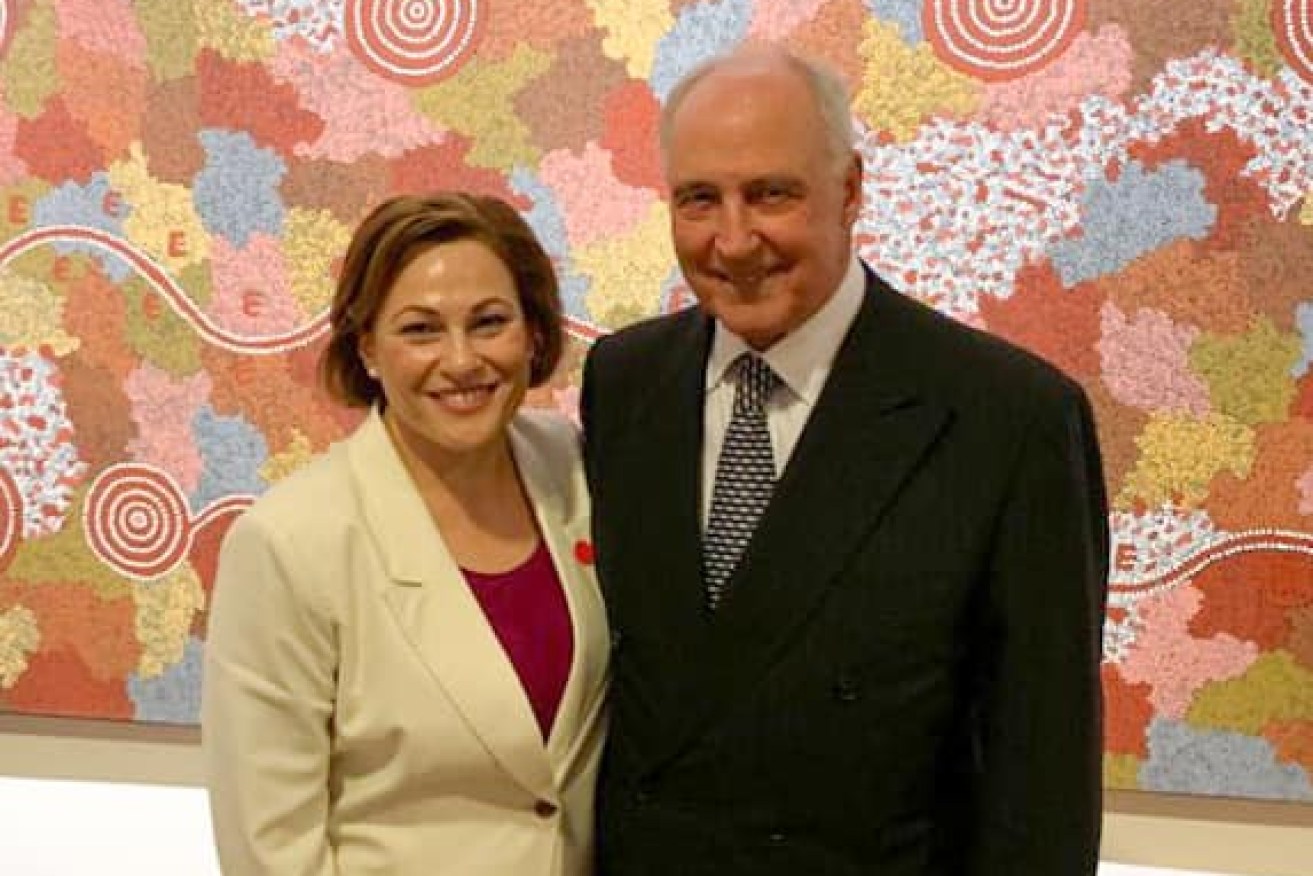What price unity when both sides get the wobbles
The most destabilising force for any winning team is frustration at not being further ahead of the opposition.

Queensland Deputy Premier Jackie Trad with former prime minister Paul Keating, who understood leadership tensions all too well. (Photo: Facebook, Jackie Trad.)
The unity, focus, and hard work needed to finish the game on top starts to erode if there are calls for radical change. Usually, the leader is blamed, or sometimes the playmaker, but it rarely ends well – even if you scrape by in the short-term.
Part of this, clearly, is the fear of losing. In politics, like sport, such a change of heart might be portrayed as dutifully listening to supporters. But, more often than not, it has little to do with new-found respect for the opposition or electorate, rather a neurotic, blinkered, sometimes arrogant belief that your side would do better if it only did things your way.
This destabilising force has been in Canberra for years, on both sides of politics. And, now, like the wobbly wheels on a speeding shopping trolley, it is starting to shake Queensland again.
When State Parliament resumed last week, the Liberal National Party Opposition was notably flat and lifeless. Their MPs looked like they expected a year of losing, and perhaps with good reason. Over the break, LNP Member for Currumbin, Jann Stuckey, had announced her retirement, in the process fuelling the debate over bullies in the LNP and the nefarious influence of a Christian faction. And Opposition Leader Deb Frecklington had remarkably created headlines for all the wrong reasons, reportedly bagging Premier Annastacia Palaszczuk for her supposedly fancy clothes.
Since then, there has been speculation Frecklington would be dumped as leader, possibly in favour of someone like David Crisafulli, or perhaps the fly-in candidate Matt Canavan, newly relieved of his federal Cabinet responsibilities. If they are not in a position to win, it is the leadership question that will be answered before the election, not any of the LNP’s apparent internal, cultural problems. Find a better captain and watch everyone come together and lift?
Labor, too, has been the subject of leadership speculation, despite being in government and keen to take the fight to Canberra this year in the absence of a competitive state opposition. Last week, local tabloid The Courier-Mail published a poll that showed a drop in support for both major party leaders and, ominously, more would-be voters sitting on the fence. Palaszczuk had not been able to capitalise on the LNP’s horror summer and, if you believe the polls any more, the scores were tied on a two-party preferred basis. Today, national broadsheet The Australian reported that Deputy Premier and Treasurer Jackie Trad was under pressure to resign from Cabinet before the election to give Labor a fighting chance.
Trad was always bound to attract attention, though perhaps more due to perception than performance. She is a Left faction leader controlling the state finances. A greenie in business clothing, playing a powerful role in Cabinet. A no-nonsense political player standing behind an almost folksy, homespun leader, their relationship either an obvious strength of government or an undeniable weakness.
The Australian reported a belief in some quarters that Trad was “dragging down the Premier’s popularity”. Ironically, there was a time when Trad was perceived to be the government’s best performer and Palaszczuk a most unlikely leader.
Trad has delivered several extraordinary budgets, doing little to pay off debt or brace for further economic shocks but seemingly happy to hire more public servants and frontline workers. Yet that doesn’t tend to upset Labor voters. Even the Queensland Audit Office this week offered an almost empathetic view of state finances, albeit flagging the politically dicey option of tax hikes.
Trad’s worst performance so far has been failing to declare an investment property in the Cross River Rail precinct, which saw her investigated by the Crime and Corruption Commission. Scarred by accusations the deceit was deliberate, Trad sold the property, and gave up responsibility for the project, while Palaszczuk copped criticism for not sacking her (just like she did when minister Mark Bailey deleted public records to hide back-channel correspondence with unions).
Another adverse finding from the CCC, which has one matter still to be finalised, would end Trad’s career. At the moment, she is working on an early state Budget, to be delivered in April and becoming increasingly complex due to various economic shocks. After then, Labor has the option of renewal before the October state election, if it was deemed likely to help. With Cameron Dick ready for greater responsibility, and ministers such as Kate Jones more than capable, Trad could be allowed to focus on retaining her seat of South Brisbane, which is at risk of falling to the Greens.
But at the same time, some voters like their local MP to be in Cabinet, so Trad taking a backseat might not help. Obviously, if Trad were to leave under a cloud then it would also reflect badly on Palaszczuk, especially if her contribution to the government has been under-appreciated all this time.
For change to be positive, it needs to be well-timed and with obvious benefits – for the entire team. If and when Trad leaves politics, the circumstances of her departure will be crucial, as a messy exit would only draw attention to Labor’s flaws and give the LNP a chance to capitalise. Palaszczuk’s position, as ever, is crucial.
As former Labor premier Peter Beattie said – repeatedly, to cast a shadow over a frustrated opposition and encourage loyalty from his own team – disunity is death. It makes you wonder, though, whether modern-day politicians might be content to let things die if their ideology lived on. Some would certainly be fine with a loss if it meant their enemies lost more.












